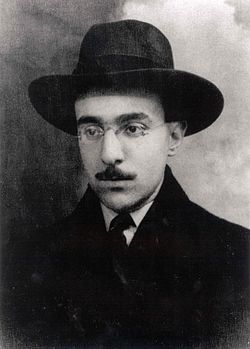Fernando Pessoa Quote
All that I've done, thought or been is a series of submissions, either to a false self that I assumed belonged to me because I expressed myself through it to the outside, or to a weight of circumstances that I supposed was the air I breathed. In this moment of seeing, I suddenly find myself isolated, an exile where I'd always thought I was a citizen. At the heart of my thoughts I wasn't I.
Fernando Pessoa
All that I've done, thought or been is a series of submissions, either to a false self that I assumed belonged to me because I expressed myself through it to the outside, or to a weight of circumstances that I supposed was the air I breathed. In this moment of seeing, I suddenly find myself isolated, an exile where I'd always thought I was a citizen. At the heart of my thoughts I wasn't I.
Related Quotes
This is a day of celebration!Today, we are divorcing the pastand marrying the present.Dance,and you will find Godin every room.Today, we are divorcing resentmentand marrying forgiveness.Sing,and God w...
Kamand Kojouri
Tags:
accept, acceptance, apathy, beloved, bitter, bitterness, celebrate, celebrating, celebration, ceremony
About Fernando Pessoa
Fernando António Nogueira de Seabra Pessoa (; Portuguese: [fɨɾˈnɐ̃du pɨˈsoɐ]; 13 June 1888 – 30 November 1935) was a Portuguese poet, writer, literary critic, translator, and publisher. He has been described as one of the most significant literary figures of the 20th century and one of the greatest poets in the Portuguese language. He also wrote in and translated from English and French.
Pessoa was a prolific writer both in his own name and approximately seventy-five other names, of which three stand out: Alberto Caeiro, Álvaro de Campos, and Ricardo Reis. He did not define these as pseudonyms because he felt that this did not capture their true independent intellectual life and instead called them heteronyms, a term he invented. These imaginary figures sometimes held unpopular or extreme views.
Pessoa was a prolific writer both in his own name and approximately seventy-five other names, of which three stand out: Alberto Caeiro, Álvaro de Campos, and Ricardo Reis. He did not define these as pseudonyms because he felt that this did not capture their true independent intellectual life and instead called them heteronyms, a term he invented. These imaginary figures sometimes held unpopular or extreme views.
